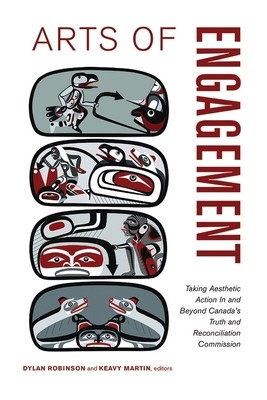
- We will send in 10–14 business days.
- Publisher: Wilfrid Laurier University Press
- Year: 2016
- Pages: 315
- ISBN-10: 1771121696
- ISBN-13: 9781771121699
- Format: 15 x 22.6 x 2.3 cm, minkšti viršeliai
- Language: English
- SAVE -10% with code: EXTRA
Arts of Engagement (e-book) (used book) | bookbook.eu
Reviews
Description
Arts of Engagement focuses on the role that music, film, visual art, and Indigenous cultural practices play in and beyond Canada's Truth and Reconciliation Commission on Indian Residential Schools.
Contributors here examine the impact of aesthetic and sensory experience in residential school history, at TRC national and community events, and in artwork and exhibitions not affiliated with the TRC. Using the framework of "aesthetic action," the essays expand the frame of aesthetics to include visual, aural, and kinetic sensory experience, and question the ways in which key components of reconciliation such as apology and witnessing have social and political effects for residential school survivors, intergenerational survivors, and settler publics.
This volume makes an important contribution to the discourse on reconciliation in Canada by examining how aesthetic and sensory interventions offer alternative forms of political action and healing. These forms of aesthetic action encompass both sensory appeals to empathize and invitations to join together in alliance and new relationships as well as refusals to follow the normative scripts of reconciliation. Such refusals are important in their assertion of new terms for conciliation, terms that resist the imperatives of reconciliation as a form of resolution.
This collection charts new ground by detailing the aesthetic grammars of reconciliation and conciliation. The authors document the efficacies of the TRC for the various Indigenous and settler publics it has addressed, and consider the future aesthetic actions that must be taken in order to move beyond what many have identified as the TRC's political limitations.
EXTRA 10 % discount with code: EXTRA
The promotion ends in 21d.23:52:55
The discount code is valid when purchasing from 10 €. Discounts do not stack.
- Publisher: Wilfrid Laurier University Press
- Year: 2016
- Pages: 315
- ISBN-10: 1771121696
- ISBN-13: 9781771121699
- Format: 15 x 22.6 x 2.3 cm, minkšti viršeliai
- Language: English English
Arts of Engagement focuses on the role that music, film, visual art, and Indigenous cultural practices play in and beyond Canada's Truth and Reconciliation Commission on Indian Residential Schools.
Contributors here examine the impact of aesthetic and sensory experience in residential school history, at TRC national and community events, and in artwork and exhibitions not affiliated with the TRC. Using the framework of "aesthetic action," the essays expand the frame of aesthetics to include visual, aural, and kinetic sensory experience, and question the ways in which key components of reconciliation such as apology and witnessing have social and political effects for residential school survivors, intergenerational survivors, and settler publics.
This volume makes an important contribution to the discourse on reconciliation in Canada by examining how aesthetic and sensory interventions offer alternative forms of political action and healing. These forms of aesthetic action encompass both sensory appeals to empathize and invitations to join together in alliance and new relationships as well as refusals to follow the normative scripts of reconciliation. Such refusals are important in their assertion of new terms for conciliation, terms that resist the imperatives of reconciliation as a form of resolution.
This collection charts new ground by detailing the aesthetic grammars of reconciliation and conciliation. The authors document the efficacies of the TRC for the various Indigenous and settler publics it has addressed, and consider the future aesthetic actions that must be taken in order to move beyond what many have identified as the TRC's political limitations.


Reviews